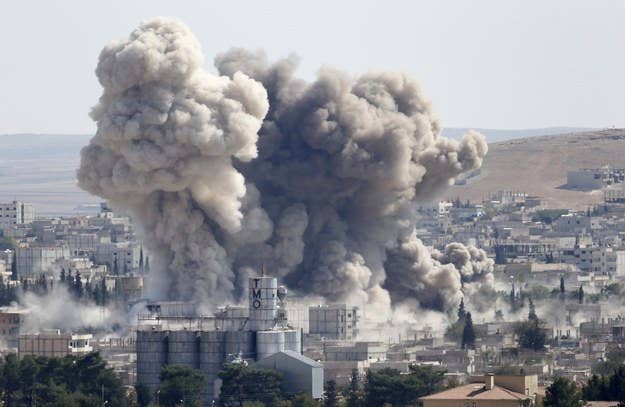
GAZIANTEP, Turkey — For many Syrians, the Senate report on the CIA's use of torture could have reinforced a narrative that has been gaining ground since the start of U.S. airstrikes in the country: that America and Syrian President Bashar al-Assad are on the same side.
The report features details of a long-established fact: that as part of a program known as extraordinary rendition, the CIA sent terrorism suspects to foreign prisons around the world, where they often faced extreme torture. And one of the CIA's key partners in this was the Assad regime.
But the report contains no direct mention of Syria — or of any country involved in the program. All were redacted ahead of publication.
These omissions were likely motivated — at least in part — by a desire to avoid antagonizing the foreign governments, whether they are friendly or not.
In the case of Syria, naming the country would have also highlighted how the line between friend and enemy has often blurred.

Syria was a secondary member of the Bush administration's infamous "Axis of Evil." Yet previous reports have detailed at length how Syria was a key player in the CIA's rendition program. A 2013 study from the Open Society Foundation noted that Syria was among the "most common destinations" for CIA rendition.
The study added: "Syria detained, interrogated, and tortured" the suspects the CIA rendered to its custody.
When he took office, Obama moved to distance himself from the worst practices of the Bush era, putting an end to water-boarding and vowing to shut down the U.S. prison at Guantanamo Bay. But for many Syrians, a perceived U.S. alliance with Assad behind the scenes is a line that connects the two presidencies.
The report's release — and the renewed focus on torture and rendition — comes at a time when many Syrians are increasingly angered by a perceived cooperation between the U.S. and the regime as they share Syria's skies.
After years of ignoring calls to do more to help the U.S.–backed opposition topple Assad, the Obama administration instead sent warplanes to bomb the extremist militants of ISIS and Jabhat al-Nusra, the Syrian branch of al-Qaeda. The regime, meanwhile, has continued using its aircraft to punish rebels and civilians alike.
The U.S. has denied coordinating with the regime — but Syrians often ask how that can be so as planes from both sides patrol overhead. The answer they often come to echoes one put forward by a Syrian pharmacist in an office near the Turkish border on Monday, as a conversation among colleagues about medical supplies erupted into a debate on U.S. policy: "America supports Assad."
The other four men in the room agreed.
The man was from the Syrian city of Raqqa, ISIS's headquarters in the country and a focal point of the U.S. campaign. After three months of U.S. strikes on militants there, the Assad regime last week launched a brutal airstrike of its own that hammered home the difficult position the Obama administration finds itself in. More than 200 civilians were reportedly killed in the regime attack, and though it might not be fair, some Syrians see the separate strikes by the U.S. and the regime as part of the same campaign.
"Everyone knows that Assad and the Americans are working together and bombing the Syrian people," said a media activist with Jabhat al-Nusra who goes by the nickname Abu Omar, citing the carnage in Raqqa.
The Raqqa pharmacist and his friends — all medical professionals who oppose ISIS — had similar things to say.
The CIA cooperated in extraordinary rendition with governments across the globe, from Poland to Thailand. It found particularly eager allies among the dictators of the Middle East. Assad is one of the CIA's leading "former torture partners" still standing strong in the region, as the Guardian's Spencer Ackerman put it, with Libya's Muammar Gaddafi killed in the Arab Spring uprisings and Egypt's Hosni Mubarak deposed.
From the early days of Syria's own uprising, which began in March 2011 with nonviolent demonstrations, Assad put forward the narrative that he was battling extremists, and as the conflict spiraled, he suggested that the West should cooperate with him and not his enemies. That claim was laughable early on but gained currency amid the surge of extremism among the opposition, which critics blame Assad for fanning. Once the U.S. and its allies began their airstrikes, Assad was quick to paint them as validation to his supporters at home.
In fact, Assad may not have minded too much if the Senate report's account of his security forces aiding the CIA in the past had not been redacted. Back then, Syria was a stated enemy of the Bush administration but the CIA cooperated with him behind the scenes anyway.
Now, with the Obama administration having repeatedly called on him to step down, it might be good for Assad to have Syrians believe that the U.S. still secretly works with him today.
"Average Syrians do believe there was cooperation in the past between the Assad regime and the Americans on a number of levels. The majority of them still believe it's there," says Adnan Hadad, a Syrian activist and journalist who heads the Aleppo Media Center. "Looking at it in the context of the airstrikes targeting ISIS and excluding Assad, with all the brutality he has brought, I think this [report] will further support that belief."
